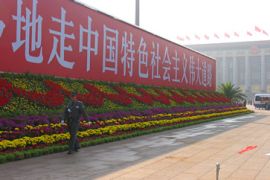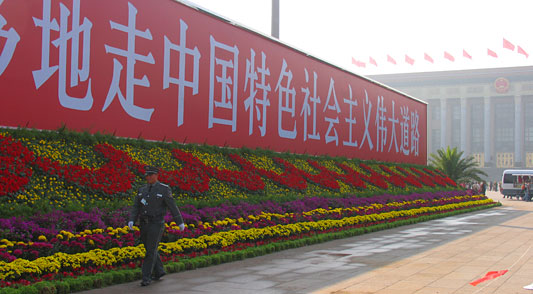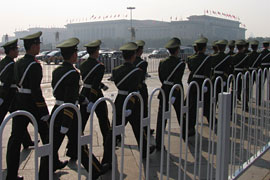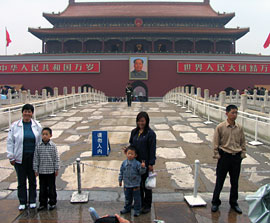Hu to tighten grip at congress
The gathering of China’s Communist party is an occasion for old-school pomp.

 |
| The message from the congress will be that both Hu and the Communists are still in charge |
It will seem to many a throwback to the days of old China.
On Monday, the country’s leaders will emerge from the mysterious Zhongnanhai compound on the edge of Beijing’s imperial Forbidden City for the 17th congress of the Chinese Communist party.
With Beijing’s Great Hall of the People swathed in revolutionary red, cadres from across the country will obediently file in from neighbouring Tiananmen Square and applaud the wise words of the nation’s leader.
Those that do not fall asleep, that is.
| China Congress |
|
|
A party congress is an occasion of old-school Communist pomp. The overriding message is, that despite massive changes wrought on China by three decades of reform, the Communist party is and will remain firmly in control.
Marking what is generally seen as the mid-point in his presidency, Hu Jintao, will open the congress with a keynote address that is effectively China’s version of a state of the union speech.
In it he will lay out the party’s achievements over the five years since he came to power – and the challenges ahead for the next five.
Attendees can expect to hear many slogans. References to the “harmonious society” and “scientific development” – hallmarks of Hu’s leadership – will be liberally spread throughout.
In the days and months that follow, expect also a lot of punditry and debate about what these concepts actually mean. No one still really seems quite sure.
The underlying theme though is stability. For China’s leaders nothing is more important.
There will be no tolerance of dissent and nothing will be allowed to challenge the Communist party’s position as the ultimate authority.
In control
You need only look on the internet at the virtual lockdown that China has gone into in the days running up to the congress, to see how determined China’s leaders are to keep control.
 |
| China’s leaders have ordered a crackdown on dissent ahead of the congress |
Thousands of blogs and websites have been shut down or blocked, while dozens of known dissidents have been arrested or warned, none too subtly, to keep their mouths shut.
China’s economy may be undergoing the fastest transformation any nation has ever seen, but its political system remains as rigid as ever.
Economic growth is steaming along in near double-digits, and certainly many have never had it so good.
At the same time as the economy has grown at an alarming rate so too have divisions in Chinese society – between town and country, coast and hinterland.
In 2006 average urban incomes were 3.28 times that of rural incomes, up from 3.21 times a year earlier.
The divisions between the “haves” in booming cities such as Shanghai, and the hundreds of millions of “have-nots” is increasingly stark.
Hu has made much of the need to address these problems, but after five years in power the disparity, if anything, seems to be getting worse.
Uneven growth
Another growing cause of alarm is the impact of the economic growth on China’s environment.
| Key party congresses |
|
1st congress. 1921 – 13 delegates including Mao Zedong meet in secret in Shanghai to formally approve aims and charter of the Communist Party of China
7th congress. 1945 – Meeting in communist forces’ stronghold of Yan’an names Mao as undisputed leader and enshrines his “thought” as party ideology
9th congress. 1969 – Meeting in Beijing at height of Cultural Revolution sees more than 80 per cent of elite central committee fired from posts
12th congress. 1982 – Deng Xiaoping advocates “socialism with Chinese characteristics”, shifting focus from central planning to free market capitalism
16th congress. 2002 – Hu Jintao succeeds Jiang Zemin as party leader, beginning first smooth leadership change since 1949 revolution. But Jiang leaves allies in key leadership posts |
“These indicators all show that there are issues at hand that the government needs to focus on and must address,” Wang Yukai, a professor at the National School of Administration at Peking University, said.
After years of unparalleled but very uneven economic growth, Wang says the party now needs to go back to basics – “we must consider the needs of the ordinary Chinese”.
And it is here that Hu’s notion of “scientific development” comes in.
In reality there is not much science to it – the idea being that China must move on from the mantra of growth for the sake of growth to a system where the nation’s limited resources are used more wisely and spread the wealth as much as possible.
That, at least, is the theory. To get it into practice, Hu needs to stamp his authority on the party.
As a result, many eyes will be on the political manoeuvrings going on in Beijing during the congress.
How the backroom dealings that will shape China’s future direction are done is, like much of the opaque world of Chinese politics, shrouded in mystery.
After Hu’s opening speech, the pomp and the applause, the real business of the congress will move into smoke-filled rooms well away from the cameras.
Some days later – no one has actually said when the congress will end – the whole thing will wind up as the new members of the all-powerful Politburo Standing Committee are rolled out in front of the world’s press.
Barring a major upset, Hu himself is certain to be confirmed in power for another five years.
But how far-reaching his grip on power will extend remains unclear.
Much will be made of whether the new Politburo line-up is stacked with Hu allies or whether his predecessor, Jiang Zemin, still considered a powerful figure behind the scenes, will continue to have influence.
Succession
There will also be a close eye on whether Hu will manage to anoint his own choice as successor when, as is expected, he steps down at the next congress in five years’ time.
 |
| Most ordinary Chinese feel little connection with the corridors of power |
The candidate widely tipped as Hu’s choice is 52-year-old Li Keqiang who is currently the party chief in the rustbelt northeastern province of Liaoning
Li is a trained economist, and a man seen by many as a Hu protege.
He, like the president, is sometimes criticised for being dull. But dull – backed up by a healthy business mind – is what makes it in the 21st century Chinese communist party.
If Li makes it into the Politburo Standing Committee, unveiled at the end of the congress, it will be a key indicator of whether his star is still in the ascendant.
It will also give an indication to the outside world of the likely future direction of what will soon be the world’s biggest economy.
Of course, what all the intrigue, factionalism and backroom deal-making actually means to 1.3 billion ordinary Chinese is another matter entirely.
Many, like 25-year-old Cheng Jing, an accountant based in Beijing, are instead focused on more down to earth issues, concerned about career development, soaring property prices and educating their children.
“I’m not a big follower of news,” Cheng told Al Jazeera over a cappuccino in one of Beijing’s fast-growing stable of trendy coffee houses.
“I read the newspaper sometimes, and follow some of what’s going on, but politics and news is just not a big part of my life.”
But the direction of China’s future is not in their hands.
Instead, for a few days in October, it will be down to a select few men in dark suits, meeting behind closed doors, mapping out the continuation of the one party state.

